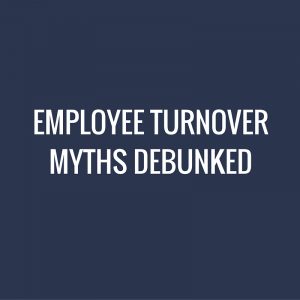Don’t farewell, fare better
 Employee Turnover Myths Debunked
Employee Turnover Myths Debunked
Every hiring manager has a view as to why they think employees leave an organisation. But all too often the evidence throws up surprisingly different reasons. We take a look at some of the most common myths and consider why they need challenging:
Low turnover is great – high turnover is terrible
This is a classic case for looking beyond the numbers. Low turnover isn’t necessarily a sign of high engagement. It can also be a sign of dwindling motivation and morale and a broad sense of complacency across the organisation. Imagine a large staff base of individuals who aren’t particularly performing and simply turn up, do the bare minimum, collect their pay and stay because it’s easy.
Change is healthy in an organisation that needs to evolve and become successful. And that requires turnover; both involuntary and voluntary. Sometimes high turnover can actually offer good employees the chance to develop and to progress internally.
Those staff who stay are engaged. Those who leave are disengaged
Interestingly, staff who are disengaged in an organisation and not performing within it are not necessarily likely to leave. Studies suggest, in fact, that just under 30 per cent of retained staff show lower engagement levels than those that move on. This means a higher number of current disengaged employees than those who have chosen to leave. The same studies show that over three quarters of exiting employees are engaged or contributing. So why do these desirable staff leave?
 The myths as to why people leave
The myths as to why people leave
Most people break out the issue of pay as a primary reason to move on, but research shows that it is actually less important to workers than work / life balance and career advancement. Salary and management are closely ranked in third and fourth position. Others believe that high turnover is industry specific. But it actually helps to compare organisations relatively, with organisations in the same industry and of a similar size. This gives more meaningful insights.
The role of management is also key. Many believe that managers play no role in affecting turnover, but they do in fact have a significant influence over whether staff stay or leave, from the hiring process itself, through to daily management, one to one processes, and pathways to higher leadership roles.
Turnover is always expensive
Everyone knows that turnover is expensive, not just in terms of payouts, but also hiring and retaining fresh staff. However, those hidden costs actually extend much further: reduced productivity; the risk of valuable customer relationships moving with exiting staff; a loss of expert knowledge; and the risk that those who remain behind end up over-worked and stressed.
New staff tend to turnover the most – and they won’t tell you why
Managers often believe that new starts are the least loyal and the most likely to switch when they spot a better work opportunity. This can be the case with millennials, but tenured staff don’t necessarily follow suit. In fact, studies suggest that longer term staff – those with over a year of employment within the organisation – are more likely to leave than newer hires. And equally, they are over 400 per cent more likely to tell you honestly that they are leaving, and why.
Turnover impacts productivity
One school of thought suggests that staff turnover is simply a fact of working life and that organisations must simply put up with it and find new staff. However, research constantly proves that organisations with the lowest turnover levels can achieve profitability levels that are 400 per cent higher than those companies with high turnover.
This is because longer-serving staff have the skills and knowledge needed to build stronger and more profitable relationships with the customer base. Those same employees can end up taking those customers with them when they move on, so lower turnover translates into retained clientele.
What other employee turnover myths would you challenge in your experience?




